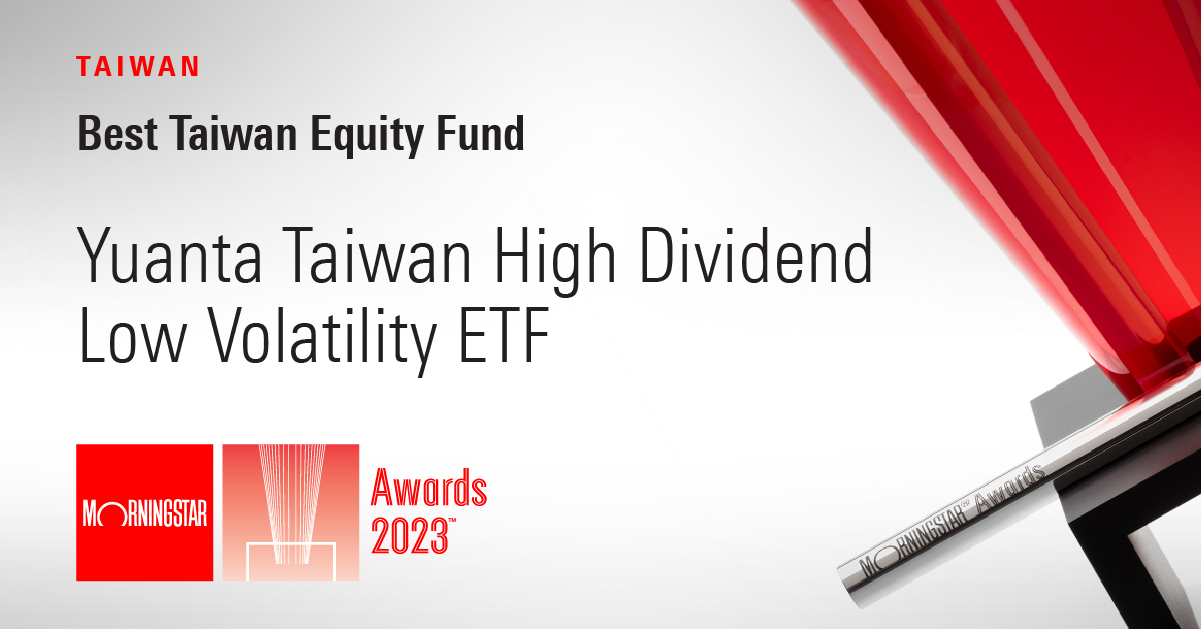
2022’s global stock and bond market correction surfaced many cheap deals that appealed to income investors. This was especially true for some stocks that do not usually pay a high dividend.

“Dividend yield is essentially an equation of earned dividend yield divided by price. If the denominator, which is share price, fluctuates a lot, the dividend yield will become unstable,” says Julian Liu, chairman at Yuanta SITC. The firm’s Yuanta Taiwan High Dividend Low Vol ETF (00713) won the Best Taiwan Equity Funds at the 2023 Morningstar Awards for Investing Excellence. The ETF earns a Morningstar quantitative rating of Bronze.
Taiwanese investor appetite for dividends is high. The home equity market itself also generates a decent yield. In 2022, an average Taiwan-listed stock gave out a 4.8% dividend yield and a dividend payout ratio as high as 60%.
Dividends As a Case for the Long-Term Investor
Liu thinks the dividend yield ratio is a good metric for long-term investors, as the ability to consistently reward shareholders with dividends has been proof of ample cash flow generation at companies.
He reflects on the initial premise of building the Yuanta Taiwan High Dividend Low Vol ETF. The idea of building a multi-factor strategy was originally from institutional investors needs, such as life insurers. “With a decades-long liability to match, these asset owners would not want to get rewarded on dividends but punished on prices or purely relying on a rise in share price. That’s when the idea kicks in – to first control the volatility, and then search for a more decent yield,” says Liu.
Speaking of volatility, as we head into the second quarter of 2023, a new confidence crisis hit the European banking sector and the monetary tightening environment is expected to stay. Liu says: “We not only live with the COVID virus, but have to thrive with high uncertainties as well as the elevated inflation rate.”
Now, he believes a high-dividend and low-volatility is an investing style that retail investors can leverage, and also buy and hold and earn a dividend yield over the years.
“A portfolio tilting towards quality will remain relevant. On the recent market events, our view is cautiously optimistic. The volatility may climb, but it also offers entry points for quality companies that are worth owning for years,” Liu concludes.
What’s In the Yuanta Taiwan High Dividend Low Vol ETF Index?
“Looking back in the past three years, investors were caught off guard by the market volatility,” Liu said, adding that striking a balance between risk and dividend return is the best way to buffer an unexpected downturn like the one seen in 2022.
Yuanta Taiwan High Dividend Low Vol ETF index’s investible universe is first screened by dividend yield. Then, a low-volatility optimizer allows the ETF to earn that regular stream of income without getting exposed to an outweighed risk in share price reductions.
The optimizer comprises both fundamental and technical factors of stocks. Five major indicators are used as an overlay –
- Profitability,
- Return on equity,
- Dividend yield,
- Operating cash flow, and
- Volatility.
The top 50 companies, based on the composite score of each stock, are included in the index.
How Did the Yuanta Taiwan High Dividend Low Vol ETF Do?
In 2022, Yuanta Taiwan High Dividend Low Vol ETF (00713) fell 7.5%. The strategy outperformed both the MSCI Taiwan Index and the Taiwan large-cap equity peers, which lost 29.8% and 22.8% on average.
In terms of single-stock performances, the largest performance contribution came from beverage packaging maker Taiwan Hon Chuan Enterprise and First Financial Holding Co Ltd. Electronic manufacturers, such as Chung-Hsin Electric & Machinery Mfg Corp, Inventec Corp, and Radiant Opto-Electronics, were also the top contributors.
Over the trailing three years ending 2022, the US$822 million ETF gained an annualized return of 11.8%, beating the index and category peers. Industrials and consumer cyclical were the major contributors in 2022.







:quality(80)/cloudfront-us-east-1.images.arcpublishing.com/morningstar/5FNGF7SFGFDQVFDUMZJPITL2LM.png)
:quality(80)/cloudfront-us-east-1.images.arcpublishing.com/morningstar/EOGIPTUNFNBS3HYL7IIABFUB5Q.png)

.jpg)





